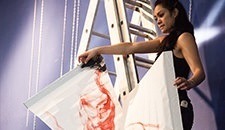A Performing Arts Manager or Arts Administrator facilitates a creative organization, giving it everything it needs to function both as a business and artistic entity. The organization can be big or small and you can operate in a range of sectors, from corporate to not for profit. Your duties can vary depending on the nature of your employer but a constant of the job is talking to people at all levels and keeping things running smoothly. The main thing to remember is that the job requires to be practically-minded and creative at the same time. Qualifications in both areas are essential which makes it an interesting and rewarding role for artistic work and your career prospects in general going forward.
Skills and qualifications
Qualifications are extremely important and highly valued. A relevant course in a subject like events management or literary studies is a great starting point. Degrees are generally accepted as a way in. Remember there is various funding you can access if you lack the resources for academic study. Sometimes you can get a job by having relevant skills from another administration role and work your way up from there. The best have a fine balance of qualifications and experience.
The arts is a highly competitive market so starting a career in performing arts management can be an uphill climb. But of course this is true of anything related to artistic endeavour. The great thing about the job is it has a strong track record for employing women and creative organizations are well-disposed toward family life. The arts are all about collaboration and enriching the human experience so while the work is hard you are expected to enjoy it too!
Despite its diverse nature performing arts management covers some specific areas which are highlighted below:
Organization
It sounds obvious but the duty of a performing arts manager is to manage and administrate. Performance is your bread and butter and it can happen anywhere, not just in a theatre or concert venue. Community and not for profit organizations are using the arts frequently to develop bonds between local people and the wider world and the logistics behind that alone demand rigorous planning for events of all sizes and descriptions! The job cries out for solid skills in areas such as programming and talent development.
Accounting
The arts is a constantly shifting industry and the money it does raise or receive needs careful handling. As a performance arts manager you’ll be drawing up budgets with the top team and ensuring it all adds up. It’s a role of gambles and tough choices and is a complex balancing act, especially if you’re operating in the not for profit sector. If numbers are your thing the job brings some intriguing challenges.
The Law
You’ve got to be at the head of the pack when it comes to creative rights and the law generally. In an increasingly litigious marketplace where original ideas are at a premium an eye for detail is invaluable. Not to mention contract negotiations for staff and clearances for music, be it a rock star gig or a local production of We Will Rock You!
Fundraising
A major element of the position is securing the funding your organization needs to achieve its aims and fulfil its potential. Employment in this field is driven more and more toward community engagement and local government which means money is strictly limited! You’ll be on the hunt for any and all possible sources of funding and investment, conducting research for these and applying for things like grants.
Marketing
The performing arts manager is called upon at times to be a performer themselves! Your stage is a website, a social media account and various media outlets. Your work will include writing press releases at speed or finding creative ways to attract an audience via posters or flyers. You have to have a streak of showmanship in you to promote your organization on a national or even global scale.
Public Relations
Good communication with everyone both inside and outside your company is the cornerstone of the job. Inside the business there are staff who could be serving drinks or schmoozing talent. You’re putting the ‘Human’ into Human Resources, recruiting the best whether they’re fully experienced or at the start of their professional journey. Negotiating their contracts and getting the best outcome you can for those toiling away at the creative coalface.
Flexibility
Hopefully it won’t surprise you that the arts doesn’t have a 9-5 schedule. Many performances take place in the evening and weekend work is a regular occurrence. If you think that could be too big a commitment then job sharing is a good option, providing part time work to fit around you and your employer.
Salary
A typical starting level salary for the role is £15,000 though it can go anywhere up to £20,000. After that it can climb to £30,000 the more experienced you are. Once you’ve progressed up the company that can become £60,000 so the monetary rewards are very attractive. Just don’t expect fame and fortune anytime soon!


 Download application form
Download application form 


